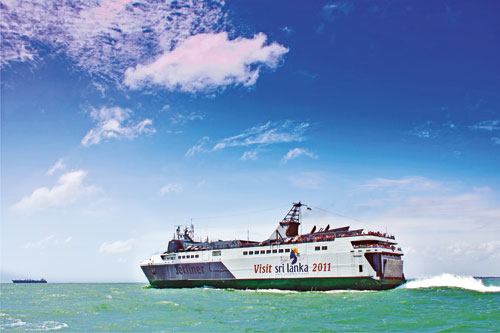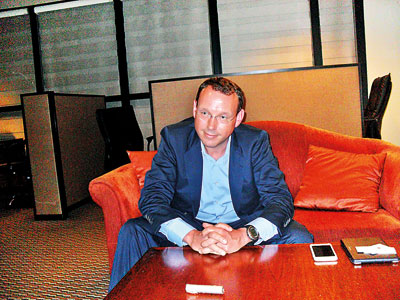Bavaria to play role of match maker for Sri Lanka SMEs

File picture of a government ship supporting a Sri Lankan Tourism campaign in 2011.
Germany’s largest state Bavaria and Sri Lanka will boost trade and investment links and promote joint ventures in technology, tourism and small and medium –sized enterprises under a new initiative agreed upon by the two parties.
This initiative is mainly aimed at extending Bavarian assistance and expertise to mentor and boost Sri Lanka’s small and medium scale enterprises (SMEs), Hans Hammer, the Honorary Consul for Sri Lanka in Bavaria revealed in an interview with Business Times in Colombo on Sunday April 23.
He noted that his country is ready to implement a matchmaking programme binding together small and medium scale entrepreneurs of both regions for the purpose of SME capacity building in Sri Lanka. Mr. Hammer pointed out that this initiative would be important for SMEs growth and development since this sector is instrumental in achieving inclusive growth.
“Companies in both Sri Lanka and Bavaria should profit from this match making arrangement, promoting mutual investments and economic cooperation,” he added.
Speaking to the Business Times hours before his departure to Germany ending a one-day working visit to the island, he noted that the Bavarian system of industrial growth, is built on a cluster approach and marked by a structured collaboration between science, research, and commerce, know-how transfer, interdisciplinary networks, and the interplay between large, small, and medium-sized enterprises.
Small and mid-sized enterprises employ approximately 75 per cent of all workers and over 80 per cent of apprentices in Bavaria. In addition, they are responsible for about 65 per cent of the value added by Bavarian companies.
Bavaria alone has a GDP of 522 billion euros, putting it ahead of 21 of the 28 European Union member states. It is home to several high technology companies such as IBM, Google, Huawei, BMW, Audi, Amazon and Microsoft.
Mr. Hammer is a well-known entrepreneur in Munich – Germany, who is committed to promote, strengthen economic and social activities in
Sri Lanka.
He studied civil engineering at the Technical University in Munich and gained his Master of Business Administration at INSEAD in Fontainebleau/France. In 1990 he began working in the real estate business and in 1998 took over the management of the Hammer Group. He has been CEO of Hammer AG since 2002.
He said his country is willing to share its expertise with Sri Lanka in key areas such as renewable energy and Information Technology and digitalisation.
A collaboration involving the sharing of knowledge and technology transfer could have a huge socio-economic impact. “We are keen to cooperate with Sri Lanka in the mission to tap SME potential,” he said.
He said clean energy and skill development, areas in which Bavaria had acquired a significant progress, would be potential sectors for collaboration.
Bavarian industrial clusters are to be motivated to tie- up with companies in Sri Lanka under this initiative he said adding that almost 90 per cent of the Bavarian IT companies are mid-sized, employing 50 to 500 people.

Hans Hammer
He said the partnership between companies could gradually be expanded to a government-level pact.
Bavaria is also exploring the possibility of promoting tourism in Sri Lanka, he disclosed adding that a high level tourism sector delegation of Sri Lanka is expected to visit Bavaria in mid September this year to find ways and means to attract more German tourists to the island nation.
Mr. Hammer noted that he is also planning a reciprocal visit of tourism experts, journalists and leading hoteliers to Sri Lanka later on.
A leading Bavarian firm will launch a massive tourist hotel project in the island soon and the land for this purpose has already been earmarked, he revealed.
Since 2009 tourism is steadily growing in Sri Lanka, he said adding that German tourists who visit Sri Lanka are not those who come on tour packages. They come here to explore the country and meet people, he said.
“We will not be able to compete with the large number of Chinese that might come, but what is important is to see is what kind of a tourist market Sri Lanka has and what the country has to offer,” he emphasised.
Mr. Hammer pointed out that he is convinced that Sri Lanka will become an even more preferred destination for German tourists.
“And of course, the Sri Lankan Embassy in Germany under the guidance of Ambassador Karunatilaka Amunugama will continue to do their utmost to further enhance the relations between the two countries,” he added.
A campaign to promote ‘Ceylon Tea’ in Bavaria is to be intensified as the black tea remains the most popular type of tea in Germany, he disclosed adding that this campaign is also planned in connection with the upcoming 150th Anniversary of Ceylon Tea.
“Innovation, creativity and consistent high quality are key elements in our German tea culture, and the recipe for positive development going forward. German consumers appreciate high quality tea specialities and new product innovations,” he said.
“Many consumers in Germany attach great importance to relaxed enjoyment – they want to take a short break from the stress of everyday life, and drink tea to relax and they could be more attracted to Ceylon tea,” he pointed out.
Germany is the third largest export market for Sri Lanka and the second largest in Europe besides the UK, which always plays a different role because of the historically closer bonds between the two countries.
Mr. Hammer met Rohan Pethiyagoda, Chairman, Sri Lanka Tea Board; Paddy Withana, Chairman – Sri Lanka Tourism Promotion Bureau; Upul Jayasuriya, Chairman/BOI and Jeevani Siriwardena, Director General Sri Lanka Export Development Board during his visit.
He said that he had fruitful discussions with these top officials on how to promote their respective sectors in Bavaria as there was immense scope for collaboration between the two states in trade, tourism, exports and investment.


